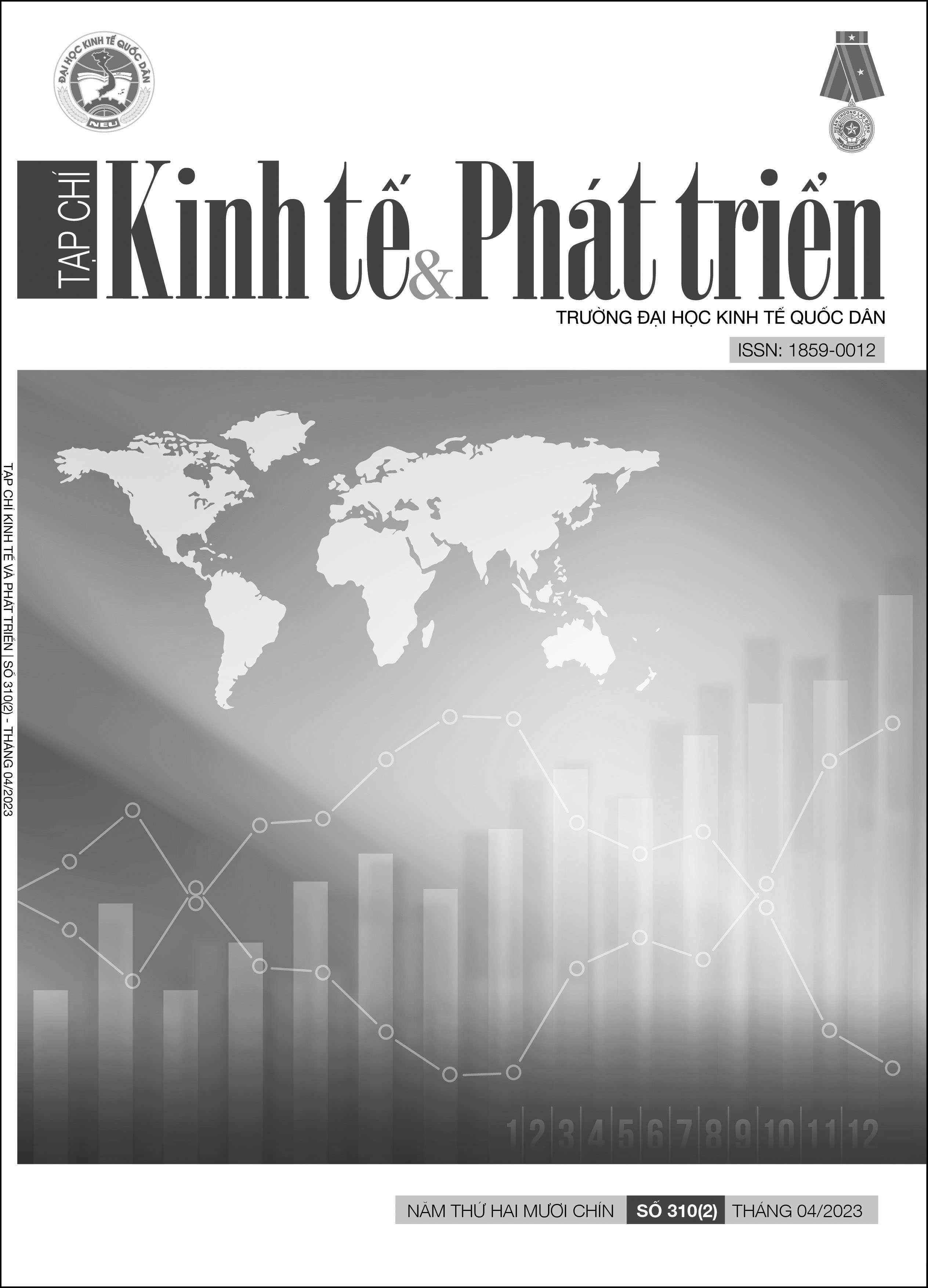Tác động của trải nghiệm đến cam kết của nhân viên với tổ chức: góc nhìn của nhân viên tương lai
DOI:
https://doi.org/10.33301/JED.VI.1267Từ khóa:
Quản trị kinh doanh, hành vi doanh nghiệp, hành vi tổ chứcTóm tắt
Trên cơ sở lý thuyết về sự cam kết và trải nghiệm của nhân viên với tổ chức, nghiên cứu này đề xuất mô hình về mối quan hệ giữa trải nghiệm (quá khứ, tương lai) và cam kết (tình cảm, tính toán). Kết quả khảo sát với mẫu gồm 200 sinh viên thực tập cho thấy trải nghiệm tương lai có tác động lớn hơn đến sự cam kết (ở cả hai loại hình tình cảm và tính toán) so với trải nghiệm quá khứ. Từ kết quả, nghiên cứu gợi ý doanh nghiệp nên chú trọng chia sẻ thông tin nhiều hơn với lao động thế hệ GenZ; các nhà nghiên cứu có thể khai thác các biến số hướng đến việc nắm bắt nhận thức của chủ thể về tương lai bởi những gì sẽ xảy ra cũng quan trọng không kém những gì đã diễn ra.
Tài liệu tham khảo
Anderson, E. & Weitz, B. (1992), ‘The use of pledges to build and sustain commitment in distribution channels’, Journal of Marketing Research, 29(1), 18-34.
Bata, W. & Hammedi, W. (2022), ‘The extended reality technology (ERT) framework for designing customer and service experiences in phygital settings: A service research agenda’, Journal of Service Management, 34(1), DOI:10.1108/JOSM-08-2022-0289.
Bersin, J. & Chamorro, T. (2019), New ways to gauge talent and potential, MIT Sloan management review.
Burgess, S.M. & Steenkamp, J.B.E. (2006), ‘Marketing renaissance: How research in emerging markets advances marketing science and practice’, International Journal of Research in Marketing, 23(4), 337-356.
Cohen, M.A., Dennett, D.C. & Kanwisher, N. (2016), ‘What is the bandwidth of perceptual experience?’, Trends in cognitive sciences, 20(5), 324-335.
Fornell, C. & Yi, Y. (1992), ‘Assumptions of the two-step approach to latent variable modeling’, Sociological Methods & Research, 20, 291-320.
Geyskens, I., Steenkamp, J.B.E. & Kumar, N. (1998), ‘Generalizations about trust in marketing channel relationships using meta-analysis’, International Journal of Research in marketing, 15, 223-248.
Geyskens, I., Steenkamp, J.B.E., Scheer, L.K. & Kumar, N. (1996), ‘The effects of trust and interdependence on relationship commitment: A trans-Atlantic study’, International Journal of research in marketing, 13(4), 303-317.
Granovetter, M. (1985), ‘Economic action and social structure: the problem of embeddedness’, American journal of sociology, 91(3), 481-510.
Gupta, S. & Vajic, M. (2000), ‘The contextual and dialectical nature of experiences’, in New Service Development, Fitzsimmons, J. and Fitzsimmons, M. (Eds.), Sage, Thousand Oaks, 33-51.
Hair, J.F., Risher, J.J., Sarstedt, M. & Ringle, C.M. (2019), ‘When to use and how to report the results of PLS-SEM’, European business review, 31(1), 2-24.
Holbrook, M.B. & Hirschman, E.C. (1982), ‘The experiential aspects of consumption: Consumer fantasies, feelings, and fun’, Journal of consumer research, 9(2), 132-140.
Itam, U. & Ghosh, N. (2020), ‘Employee experience management: A new paradigm shift in HR thinking’, International Journal of Human Capital and Information Technology Professionals, 11(2), 39-49.
Mathieu, J.E. & Zajac, D.M. (1990), ‘A review and meta-analysis of the antecedents, correlates, and consequences of organizational commitment’, Psychological bulletin, 108(2), 171-194.
Meyer, J.P. & Allen, N.J. (1991), ‘A three-component conceptualization of organizational commitment’, Human resource management review, 1, 61-89.
Meyer, J.P. & Herscovitch, L. (2001), ‘Commitment in the workplace: Toward a general model’, Human resource management review, 11(3), 299-326.
Morgan, R.M. & Hunt, S.D. (1994), ‘The commitment-trust theory of relationship marketing’, Journal of marketing, 58(3), 20-38.
Mowday, R.T. & Lee, T.W. (1986), ‘The influence of propensity to become committed on the development of commitment and prediction of turnover during organizational entry’, Proceedings of Academy of Management, Briarcliff Manor, NY.
Nenonen, S., Storbacka, K. & Windahl, C. (2019), ‘Capabilities for market-shaping: Triggering and facilitating increased value creation’, Journal of the Academy of Marketing Science, 47(4), 617-639.
Porter, L.W., Steers, R.M., Mowday, R.T. & Boulian, P.V. (1974), ‘Organizational commitment, job satisfaction, and turnover among psychiatric technicians’, Journal of applied psychology, 59, 603-609.
Sharma, P., Luk, S.T.K., Cardinali, S. & Ogasavara, M.H. (2018), ‘Challenges and opportunities for marketers in the emerging markets’, Journal of Business Research, 86(5), 210-216.
Sheth, J.N. (2011), ‘Impact of emerging markets on marketing: Rethinking existing perspectives and practices’, Journal of marketing, 75(4), 166-182.
Van De Gaag, M.A., Albers, C.J. & Kunnen, E.S. (2017), ‘Micro-level mechanisms of identity development: The role of emotional experiences in commitment development’, Developmental Psychology, 53(11), 2205-2217.
Verhoef, P.C., Lemon, K.N., Parasuraman, A., Roggeveen, A., Tsiros, M. & Schlesinger, L.A. (2009), ‘Customer experience creation: Determinants, dynamics and management strategies’, Journal of retailing, 85(1), 31-41.
Watson, G.F., Worm, S., Palmatier, R.W. & Ganesan, S. (2015), ‘The evolution of marketing channels: Trends and research directions’, Journal of Retailing, 91(4), 546-568.
Yahaya, R. & Ebrahim, F. (2016), ‘Leadership styles and organizational commitment: literature review’, Journal of management development, 35(2), 190-216.





